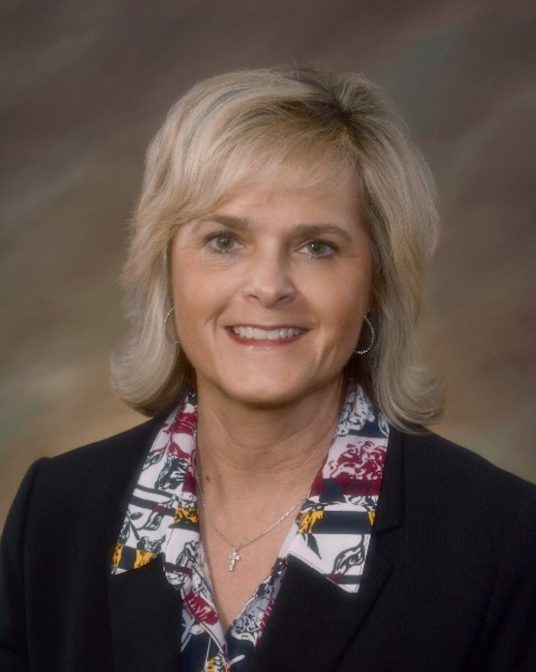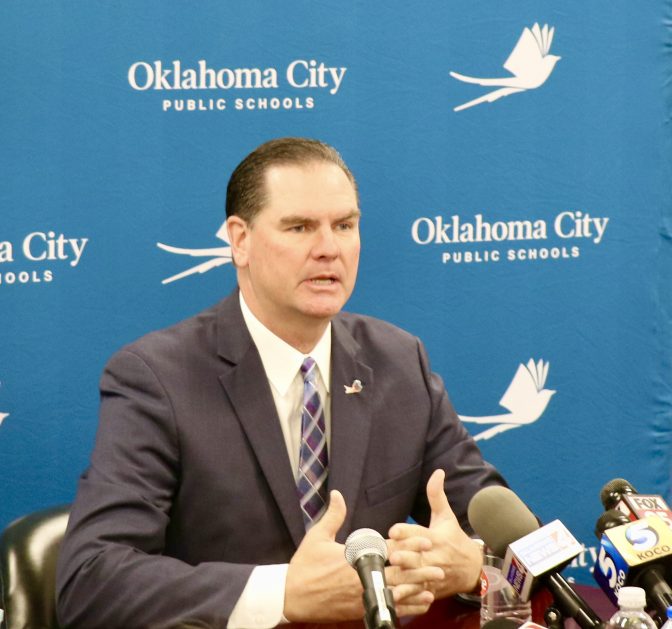
Calumet Elementary School students read together in spring 2020. Older students and younger students would team up to improve their reading, however programs like this have been scrapped because of COVID-19.
Robby Korth / StateImpact Oklahoma


Calumet Elementary School students read together in spring 2020. Older students and younger students would team up to improve their reading, however programs like this have been scrapped because of COVID-19.
Robby Korth / StateImpact Oklahoma
Backlash is mounting toward a resolution passed by Oklahoma’s State Board of Education to equalize funding for charter and traditional public schools.
More than 100 superintendents and school boards around the state are concerned about a recent move by Oklahoma’s State Board of Education to equalize funding of charter and traditional public schools.
Additionally, state lawmakers are exploring a measure to nullify the state board’s decision that would also provide some other funding for brick and mortar charter schools.

Courtesy Shawnee Public Schools
Shawnee Public Schools Superintendent April Grace.
Shawnee Public Schools passed a motion to explore joining litigation efforts against the State Board of Education Monday night.
“Our board has interest in and moving forward in whatever manner to try to protect the taxpayer dollars that are paid into property taxes and the ad valorem building fund for our students,” Shawnee superintendent April Grace said.
And the district wasn’t alone Monday night.
Sand Springs, Millwood and Yukon Public Schools passed similar motions calling for the state board to rescind its resolution and allowing legal counsel to pursue action to protect local funds.
Lawton’s Board of Education is considering one on Tuesday.
“We hope the issue is resolved at the state level without the district needing to file a lawsuit, but the district has a responsibility to look out for the best interest of its students,” Lawton superintendent Kevin Hime said in a written statement. “Our hope is the courts will uphold the state constitution and ensure that when Lawton residents pay property taxes, those taxpayer dollars will continue to support students in Lawton Public Schools.”
The law firm Rosenstein Fist and Ringold has heard from more than 90 districts in 45 counties, attorney Bo Rainey said.
The smallest district has roughly 100 students, Rainey said, the largest has more than 20,000.
A total of 25 districts have contacted the Center for Education Law, attorney Laura Holmes said.
She said the districts range in size from small rural to urban schools.
State lawmakers also appear interested in halting local revenues from going to charter schools. In a unanimous vote Tuesday, the House’s education committee passed Senate Bill 229, which would effectively nullify the state board’s vote to allow some local revenues to go to charter schools.
The measure has a long road ahead. It would need to be passed by the House and then voted on by the Senate.
But as written now, it would essentially use revenues from medical marijuana taxes to fund school buildings for charter schools.
It clarifies that charter schools can’t receive local tax dollars, period, Rep. Kyle Hilbert, R-Bristow said.
“What it instead does is allows the brick and mortar charters, in leiu of local dollars, will instead begin receiving a portion of marijuana tax dollars for their building fund,” Hilbert said.
That action would nullify the state board of education’s resolution that flipped public school funding on its head in late March. The board voted 4-3 on a resolution to “equalize funding for all charter schools and public schools.”
The resolution, introduced by recent Gov. Kevin Stitt appointee Trent Smith, will open up funding streams for charter schools that had previously been off limits. It comes as a vehicle to settle a lawsuit filed in 2017 by the Oklahoma Public Charter School Association. That suit alleged the state didn’t fairly fund charter schools – schools that public school students can opt into attending, which are overseen by a sponsor and free from some state regulations.
Charter schools don’t receive some state funds as well as monies from local taxes. The resolution would change that effective July 1.
Oklahoma City Public Schools was the first district to mount fresh opposition to the resolution.
Last week, the district’s Board of Education unanimously backed a resolution to try and halt the funding equalization from taking effect.

Robby Korth / StateImpact Oklahoma
Oklahoma City Public Schools Superintendent Sean McDaniel at a January 2020 press conference.
OKCPS Superintendent Sean McDaniel estimates the rule change will cost the district millions of dollars.
“This puts our district in a very challenging position,” McDaniel said. “And never, ever would I have agreed to this settlement.”
Tulsa Public Schools Superintendent Deborah Gist has criticized the resolution and called for it to be immediately rescinded. Following OKCPS’ action last week, TPS put out the following statement:
“We are in full support of Oklahoma City Public Schools’ cross claims,” the statement said. “We are in the process of preparing our own response to the Oklahoma State Board of Education’s action and expect to move forward in the next few days.”
Shawnee’s superintendent Grace said she’s glad to see districts band together against the state board’s action. But that’s not everything.
“It’s always important that the education community work together and to collaborate together. And I would say we need to all do that collectively,” she said. “But at the same time, I think our ultimate responsibility is to the students within our community and serving those students and those families that are within our communities.”